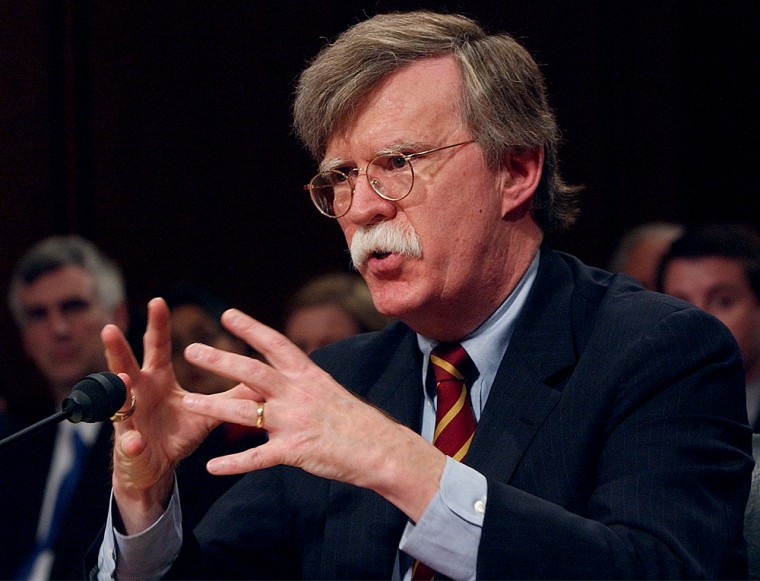Republicans face another showdown vote Thursday, but seem confident of muscling John Bolton’s nomination to be U.N. ambassador through the Senate, giving the post to the man President Bush says will reform the world organization.
Democrats said they might try delaying the planned vote on Bolton until next month unless they get internal State Department documents and classified intelligence information they have been denied for weeks.
Critics of the outspoken conservative say he has mistreated co-workers and taken liberties with government intelligence.
On Wednesday, a top Republican said exhaustive investigations turned up nothing to disqualify Bolton.
Sen. Richard Lugar, R-Ind., chairman of the Senate Foreign Relations Committee that reviewed Bolton’s nomination for weeks without recommending he be confirmed, offered a lukewarm endorsement of President Bush’s nominee.
“We should not lose sight of the larger national security issues concerning U.N. reform and international diplomacy that are central to this nomination,” Lugar said. He said Bush had chosen Bolton to “undertake this urgent mission” and “deserves to have his nominee represent him at the United Nations.”
Bush has praised Bolton as the sort of tough-talking advocate for change that can help shake up a hidebound United Nations bureaucracy. Republicans want to vote on Bolton on Thursday, before the Senate leaves for a Memorial Day recess.
A leading Democratic opponent of Bolton, Sen. Joseph P. Biden Jr., D-Del., agreed the United Nations needs reform, but said Bolton is not the man to do it.
“His credibility is in grave doubt,” Biden said. “He is an ideologue ... and he lacks the trust and confidence of his superiors.”
Biden and Sen. Christopher Dodd, D-Conn., told reporters they will try to block a final vote on Bolton unless the Bush administration turns over further documents and classified information on Bolton.
Disputed information
Part of the disputed information involves Bolton’s acknowledged requests for the names of fellow government officials whose communications were secretly recorded. Democrats want more information about why Bolton sought the information and whose communications he reviewed.
Before debate began, the Republican and Democratic heads of the Senate Intelligence Committee released dueling accounts of a briefing they alone received on the material picked up by the National Security Agency.
The briefing by Lt. Gen. Michael Hayden, the nation’s No. 2 intelligence official, showed Bolton did nothing improper, Intelligence Committee Chairman Sen. Pat Roberts, R-Kansas, wrote in a letter to Lugar.
“Ultimately, I found no basis to question the justification for, or appropriateness of, Mr. Bolton’s requests for the identities,” Roberts wrote.
The committee’s vice chairman, Sen. Jay Rockefeller, D-W. Va., agreed that he has nothing to indicate that Bolton acted improperly, but stressed that the briefing two weeks ago did not provide crucial details.
Intelligence officials withheld the names from the two senators, Roberts and Rockefeller said.
“Based on the information available to me, I do not have a complete understanding of Mr. Bolton’s handling of the identity information after he received it,” Rockefeller wrote.
Debate follows approval of judge
The Senate opened debate on Bolton’s nomination immediately after confirming one of President Bush’s most controversial nominees for a federal judgeship. Republicans said they were confident they would prevail in a chamber they control 55-44, with a Democratic-leaning independent.
On Tuesday, Sen. Barbara Boxer, D-Calif., decided to drop her plan to use procedural delays to prevent the debate on Bolton from beginning.
Also Tuesday, Sen. Sen. George Voinovich, R-Ohio, asked colleagues to vote against a “controversial and ineffective ambassador.”
The maverick Republican senator had forced a Foreign Relations committee delay on Bolton’s nomination last month. He then brokered an unusual compromise that sent the nomination to the full Senate without the customary recommendation from a Senate committee.
Voinovich echoed Democratic objections to Bolton, saying his conduct and temperament make him ill-suited for a sensitive diplomatic post. Voinovich planned to make a lengthy case against Bolton on the Senate floor.
